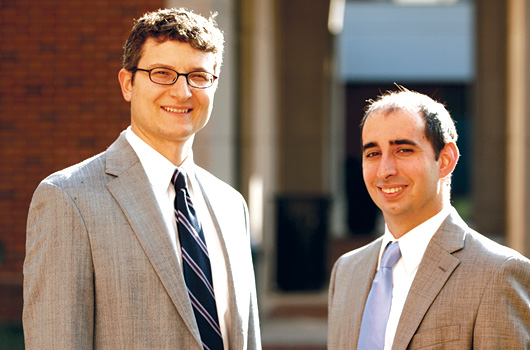POLITICS & FINANCE
In Light of McCutcheon, Does Disclosure Deter Political Corruption
By Brian McNeill

The U.S. Supreme Court heard oral arguments in October in a case testing the constitutionality of federal limits on aggregate contributions by an individual to a candidate, political action committee, or political party.
Central to the case is the commonly held belief that campaign finance disclosure deters political corruption. But that belief is untested and might be flawed, according to a new analysis by Professor Michael Gilbert and co-author and third-year student Benjamin Aiken.
Although individual donors can give $2,600 to a particular federal candidate, federal law limits the total of what can be given to all campaigns and political organizations during an election cycle. The government argued in McCutcheon v. Federal Election Commission that the aggregate limits— $123,200 for the 2013-14 election cycle, with a maximum of $48,600 to all candidates and $74,600 to all PACs and parties — remain necessary to prevent political corruption.
Opponents, such as Alabama conservative activist Shaun McCutcheon and the Republican National Committee, argue instead that the overall campaign contribution cap is an unconstitutional infringement on political speech. And, they point out, the Supreme Court has already suggested that so long as campaign contributions are disclosed, there should be little concern about corruption.
In "Disclosure and Corruption," however, Gilbert and Aiken suggest that campaign finance disclosure might exacerbate corruption rather than reduce it.
"Here's the basic theory: If I want to buy a candidate's vote and the candidate wants to sell me that vote, we can't sign an enforceable contract. Courts don't enforce illegal contracts," Gilbert said. "So the only way this quid-pro-quo happens is if we trust each other. I have to be confident that if I give you the money today, you're going to give me the vote six months from now."
How do the corrupt donor and corrupt politician assess one another's credibility? With campaign finance disclosure records, Gilbert and Aiken suggest.
"How do I know this politician is going to follow through? Well, if I can look at 10 years of disclosure records and see that everybody who's funneled $10,000-plus to this person subsequently gets a vote, then that gives me faith that this person is actually going to follow through," Gilbert said.
The paper does not claim that disclosure is necessarily a bad idea or that disclosure causes corruption, Gilbert said.
"The claim is that this is complicated," he said. "Disclosure might reduce corruption by exposing illicit deals, but it can simultaneously facilitate corruption by giving the parties greater certainty that if they try to do [a corrupt] deal, it's going to pay off for them — the other side is going to follow through."
There have been no empirical studies testing the theory that disclosure reduces corruption, Gilbert said, partly because it would be difficult to measure what is meant by "corruption," but also because there is little interest in proving something that nearly everyone believes to be true.
"It may be that the conventional wisdom is right: On balance, disclosure reduces corruption. But it doesn't have to be that way. It could also be that disclosure makes it worse," he said. "We're not trying to make a bold claim that we can't support, like 'Disclosure's always bad' or 'It's always good.' We're just trying to think through the theory carefully and completely."
Gilbert and Aiken write that their analysis has implications for the law.
In McCutcheon, the appellant is asking the Supreme Court to knock down the federal limit on total contributions to candidates in an election cycle, partly because disclosure requirements deter enough corruption to make contribution limits unnecessary. The Court, which placed great faith in disclosure in Citizens United, may "take the bait," Gilbert and Aiken argue.
"If disclosure causes corruption, then existing jurisprudence and the turn it may take in McCutcheon rest on a shaky foundation," they wrote.
Their analysis also has implications for policy, they said.
"If mandated disclosure chills lawful speech, consumes enforcement resources, and raises the risk of corruption, then perhaps it does not belong in a rational campaign finance system," they wrote.
While that logic might discourage proponents of campaign finance reform, they continued, disclosure only exacerbates corruption under certain circumstances.
"Furthermore," they added, "if disclosure cannot prevent corruption, then that strengthens calls for other anti-corruption measures, including public funding, stricter contribution limits, and perhaps new restrictions on independent expenditures."




